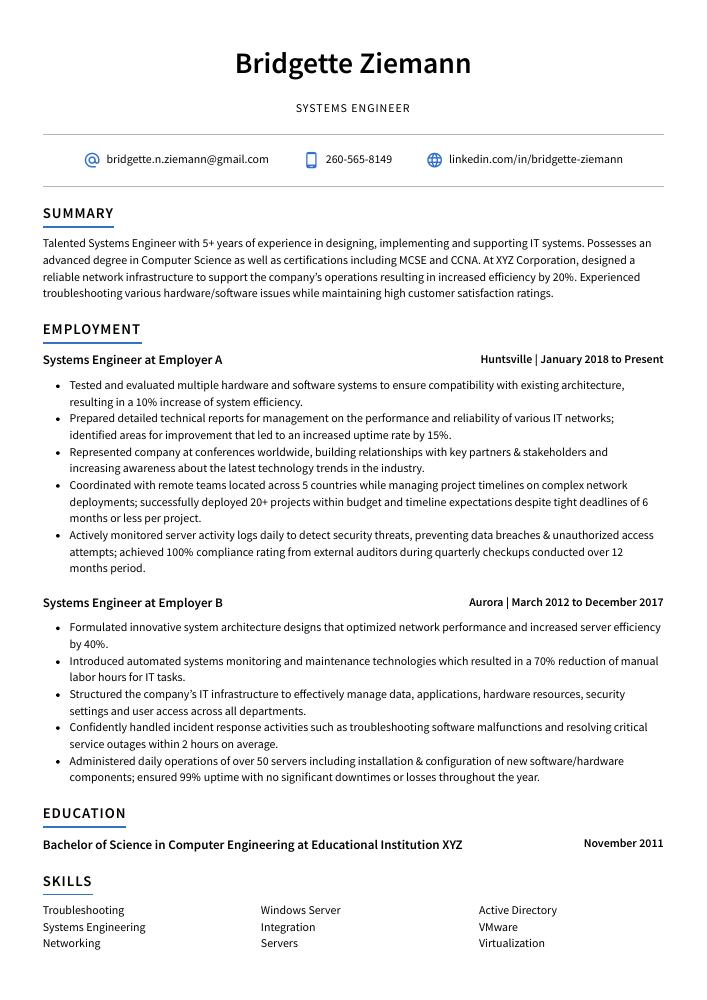Systems Engineer Resume Guide
Systems Engineers manage the design, implementation and maintenance of complex computer systems. They develop solutions to technical problems that are tailored to their clients’ needs, as well as monitor performance and troubleshoot any issues with existing infrastructure. Additionally, they provide advice on hardware or software upgrades which can improve system efficiency.
You know how to build and maintain complex systems, but employers don’t yet realize it. To get their attention and make them aware of your capabilities, you must craft a resume that stands out from the crowd.
This guide will walk you through the entire process of creating a top-notch resume. We first show you a complete example and then break down what each resume section should look like.
Table of Contents
The guide is divided into sections for your convenience. You can read it from beginning to end or use the table of contents below to jump to a specific part.
Systems Engineer Resume Sample
Bridgette Ziemann
Systems Engineer
[email protected]
260-565-8149
linkedin.com/in/bridgette-ziemann
Summary
Talented Systems Engineer with 5+ years of experience in designing, implementing and supporting IT systems. Possesses an advanced degree in Computer Science as well as certifications including MCSE and CCNA. At XYZ Corporation, designed a reliable network infrastructure to support the company’s operations resulting in increased efficiency by 20%. Experienced troubleshooting various hardware/software issues while maintaining high customer satisfaction ratings.
Experience
Systems Engineer, Employer A
Huntsville, Jan 2018 – Present
- Tested and evaluated multiple hardware and software systems to ensure compatibility with existing architecture, resulting in a 10% increase of system efficiency.
- Prepared detailed technical reports for management on the performance and reliability of various IT networks; identified areas for improvement that led to an increased uptime rate by 15%.
- Represented company at conferences worldwide, building relationships with key partners & stakeholders and increasing awareness about the latest technology trends in the industry.
- Coordinated with remote teams located across 5 countries while managing project timelines on complex network deployments; successfully deployed 20+ projects within budget and timeline expectations despite tight deadlines of 6 months or less per project.
- Actively monitored server activity logs daily to detect security threats, preventing data breaches & unauthorized access attempts; achieved 100% compliance rating from external auditors during quarterly checkups conducted over 12 months period.
Systems Engineer, Employer B
Aurora, Mar 2012 – Dec 2017
- Formulated innovative system architecture designs that optimized network performance and increased server efficiency by 40%.
- Introduced automated systems monitoring and maintenance technologies which resulted in a 70% reduction of manual labor hours for IT tasks.
- Structured the company’s IT infrastructure to effectively manage data, applications, hardware resources, security settings and user access across all departments.
- Confidently handled incident response activities such as troubleshooting software malfunctions and resolving critical service outages within 2 hours on average.
- Administered daily operations of over 50 servers including installation & configuration of new software/hardware components; ensured 99% uptime with no significant downtimes or losses throughout the year.
Skills
- Troubleshooting
- Windows Server
- Active Directory
- Systems Engineering
- Integration
- VMware
- Networking
- Servers
- Virtualization
Education
Bachelor of Science in Computer Engineering
Educational Institution XYZ
Nov 2011
Certifications
Certified Systems Engineering Professional (CSEP)
International Council on
May 2017
1. Summary / Objective
Your resume summary or objective should give the hiring manager a quick overview of your qualifications and experience as a systems engineer. In this section, you can highlight your technical expertise in areas such as cloud computing, automation scripting, system architecture design, and software development. You could also mention any certifications you have obtained or awards won for successful projects completed.
Below are some resume summary examples:
Reliable and experienced systems engineer with a strong background in developing, maintaining, and troubleshooting complex computer networks. Skilled at designing secure infrastructures to meet customer needs while adhering to industry standards. At XYZ Technologies, successfully implemented a new system infrastructure that increased efficiency by 25%. Committed to delivering reliable solutions through careful planning and data-driven decision making.
Skilled systems engineer with 5+ years experience in managing, designing, and implementing complex IT systems. Proven track record of success working on projects from initial requirements analysis to final implementation. At ABC Technologies, designed a highly-available system that improved application uptime by 28%. Looking for an opportunity to apply my knowledge and problem solving skills at ABC Systems as a Senior Systems Engineer.
Dependable Systems Engineer with 5+ years’ experience in setting up, testing, and troubleshooting computer networks. Expertise in developing network infrastructure solutions to improve system performance and reliability. At XYZ Co., successfully implemented a cloud-based hosting platform that reduced downtime by 50%. Recognized for excellent customer service skills while providing technical support over the phone or remotely.
Committed systems engineer with 7+ years of experience developing and managing complex technology solutions for large-scale corporate environments. Demonstrated success in streamlining infrastructure processes, improving system performance, and troubleshooting technical issues. Looking to join ABC Tech’s team to leverage my expertise in designing efficient systems that improve workflow productivity across the organization.
Accomplished systems engineer with 8+ years of experience designing, implementing, and managing secure IT networks. Proven ability to set up high-availability infrastructures that are resilient even in the face of unexpected traffic spikes. Seeking to join ABC Tech as a senior systems engineer and use my extensive knowledge of networking protocols and best practices to help create reliable solutions for customers.
Amicable and organized systems engineer with 6+ years experience in the design, implementation and maintenance of complex IT infrastructures. Achieved over 99% uptime for all client networks to ensure uninterrupted service delivery. Seeking to join ABC Technologies as a senior systems engineer where I can apply my expertise in networking technologies, cloud computing, automation and security protocols.
Seasoned Systems Engineer with 5+ years of experience designing, developing and deploying cutting-edge solutions for various enterprises. Expertise in managing complex projects from requirements gathering through implementation to ensure maximum customer satisfaction. Skilled at troubleshooting issues quickly and delivering reliable solutions that maximize efficiency while minimizing downtime.
Detail-oriented systems engineer with 4+ years of experience designing and implementing innovative systems solutions. As a key member of the XYZ team, identified gaps in existing processes that enabled us to improve network security by 30%. Eager to join ABC as a Systems Engineer where I can apply my skills in developing secure infrastructure solutions for an enterprise environment.
2. Experience / Employment
Next comes the work history section. This should be written in reverse chronological order, meaning your most recent role is listed at the top.
When stating what you did, stick to bullet points. Doing so allows the reader to digest what you have to say quickly. You want to take some time to think about the details of what you did and any quantifiable results obtained from it.
For example, instead of saying “Installed new software,” you could say, “Successfully installed a complex ERP system across multiple departments within 6 weeks; this resulted in an 11% improvement in efficiency.”
To write effective bullet points, begin with a strong verb or adverb. Industry specific verbs to use are:
- Designed
- Configured
- Monitored
- Analyzed
- Optimized
- Implemented
- Troubleshot
- Resolved
- Automated
- Installed
- Upgraded
- Documented
- Tested
- Debugged
- Administered
Other general verbs you can use are:
- Achieved
- Advised
- Assessed
- Compiled
- Coordinated
- Demonstrated
- Developed
- Expedited
- Facilitated
- Formulated
- Improved
- Introduced
- Mentored
- Participated
- Prepared
- Presented
- Reduced
- Reorganized
- Represented
- Revised
- Spearheaded
- Streamlined
- Structured
- Utilized
Below are some example bullet points:
- Reduced network downtime by 70% through rapid troubleshooting of hardware and software problems.
- Compiled detailed technical reports on system performance, identifying areas for improvement and recommending solutions to management; resulting in an increase of efficiency by 25%.
- Substantially improved network security measures by designing a custom firewall solution with robust encryption protocols; protecting sensitive data from potential external threats.
- Designed, tested and implemented multiple wireless networks for corporate offices with over 1,500+ users; completed the project 2 weeks ahead of schedule while staying within budget limitations.
- Installed new servers & storage systems across 10 remote locations, ensuring that all components were configured correctly according to best practices guidelines established by IT department standards & procedures manual.
- Assessed and optimized system performance, increasing efficiency by 15% and reducing downtime hours to less than 5 per month.
- Debugged software issues and resolved hardware malfunctions with meticulous attention to detail; successfully reduced the average time taken for repairs from 3 days to 2 days.
- Troubleshot networking problems between 50+ computers, servers & printers in multiple locations across a large network infrastructure; achieved complete resolution within 24 hours or less on all occasions.
- Utilized scripting languages such as Python and Bash shell in combination with various monitoring tools (e.g., Splunk) to automate processes that improve overall IT systems operations by 30%.
- Developed several custom-made applications leveraging Java & JavaScript programming language which resulted in enhanced user experience with 20% faster response times on webpages/applications compared to prior releases.
- Facilitated the development and implementation of network systems for 10+ clients, reducing deployment times by 30% on average.
- Efficiently upgraded existing server hardware and software components at various customer locations to improve system performance by 20%.
- Developed 10 new security protocols in line with industry standards and regulations, ensuring secure storage of confidential client data without any breach incidents reported during the last year.
- Participated in a wide array of technical projects such as troubleshooting IT issues, developing web applications/tools using HTML5/CSS3 & JavaScript technologies; saved 8 hours per project due to efficient coding ability & debugging skillset.
- Designed an automated backup solution that reduced manual processes by 50%, resulting in cost savings up to $15K per month while improving overall reliability & scalability across different customer networks.
- Documented the development and implementation of over 50 systems engineering projects, resulting in a 25% decrease in system downtime.
- Presented on the latest software design technologies at two regional conferences, increasing awareness of best practices and industry standards among peers.
- Consistently analyzed complex software architecture to identify areas for improvement; developed, tested & deployed more than 30 improvements with no reported bugs or errors.
- Reorganized existing databases to increase efficiency by 75%; cut average query time from 15 minutes to under 5 minutes per request while maintaining data integrity across all platforms & applications used throughout the organization’s IT infrastructure.
- Spearheaded the creation of 10 new security protocols that improved overall system protection against malware threats by 45%.
- Analyzed and troubleshot complex systems issues for a global client base of 500+, resulting in reduced downtime by 30% and improved system performance.
- Automated manual processes through scripting and coding, increasing the accuracy of data management procedures by 40%.
- Achieved greater operational efficiency across all network infrastructure platforms, leading to cost savings of $6,000 for the organization over 6 months.
- Diligently monitored servers & networks on a 24/7 basis; identified problems before they caused major disruptions every time, reducing outages from 4 times per month to 2 or less times annually.
- Mentored junior engineers on software development techniques while keeping up with industry trends & new technologies; provided technical guidance that resulted in successful projects completion within budgeted timelines 90% of the time.
- Demonstrated advanced knowledge in network engineering, system architecture and scripting languages to design, implement and maintain complex IT systems; improved system performance by 45% over 4 months.
- Resolved various hardware & software issues quickly with minimal downtime; decreased service desk tickets related to technical problems by 32%.
- Improved security protocols for a client-server environment through comprehensive risk assessments, threat analysis and data encryption techniques.
- Independently developed more than 10 automated scripts utilizing Python coding language which saved up to 3 hours of manual labor each day on routine tasks and enabled staff members to focus on other important duties instead.
- Advised team members on best practices when setting up new workstations or troubleshooting existing ones; reduced setup time from 4+ hours per machine down to 2 hours on average.
- Streamlined system operations and maintenance tasks by creating automated scripts, resulting in a 25% reduction of system downtime.
- Implemented virtualization techniques to reduce hardware costs by $50K+ per month; consolidated 50 physical servers into 10 virtual systems with minimal disruption to existing services.
- Optimized application performance through increased system monitoring, achieving an average response time improvement of 40%.
- Effectively troubleshot software problems across multiple operating systems and platforms for 200+ users at any given time, resolving 90% within 2 hours or less without need for escalation support.
- Expedited the resolution process of critical incidents involving business-critical applications by 35%, ensuring that service levels were maintained at all times even during peak periods of usage.
- Competently managed the installation and maintenance of 200+ computer systems, networks and servers for multiple clients, ensuring that all functions were running optimally.
- Revised system security protocols to protect against cyber attacks; reduced company’s susceptibility to malicious intrusion by 75%.
- Monitored network performance on a daily basis; identified potential problems in advance and took proactive measures to resolve them before they escalated into major issues.
- Configured hardware components such as routers, switches, firewalls etc., enabling improved data transfer speeds across the network while maintaining acceptable levels of latency at all times.
3. Skills
The skillset employers require in an employee will likely vary, either slightly or significantly; skimming through their job adverts is the best way to determine what each is looking for. One organization might require experience with Linux, while another might need expertise in Windows.
It is essential to tailor the skills section of your resume for each job you are applying for; this ensures that it will be picked up by applicant tracking systems used by many employers these days. These programs scan resumes for certain keywords and characteristics before passing them on to a human recruiter or hiring manager.
In addition to listing relevant skills here, you should also discuss them further in other sections such as the summary or work experience section – this allows recruiters to get an even better understanding of what makes you qualified for the position at hand.
Below is a list of common skills & terms:
- Active Directory
- Aerospace
- AutoCAD
- C
- C++
- Citrix
- Cloud Computing
- Computer Hardware
- DNS
- Data Analysis
- Data Center
- Databases
- Disaster Recovery
- DoD
- Earned Value Management
- Electronics
- Engineering
- Engineering Management
- Firewalls
- HTML
- Hardware
- ITIL
- Information Technology
- Integration
- Java
- Linux
- MATLAB
- Microsoft Exchange
- Microsoft SQL Server
- Network Administration
- Network Security
- Networking
- Operating Systems
- Process Improvement
- Program Management
- Python
- Requirements Analysis
- Requirements Management
- SOLIDWORKS
- SQL
- Security
- Security Clearance
- Servers
- SharePoint
- Software Development
- Software Documentation
- Software Installation
- Switches
- System Administration
- System Architecture
- System Design
- Systems Engineering
- TCP/IP
- Team Leadership
- Teamwork
- Technical Support
- Telecommunications
- Testing
- Troubleshooting
- Unix
- VMware
- VMware ESX
- VPN
- Virtualization
- VoIP
- Windows
- Windows 7
- Windows Server
4. Education
Including an education section on your resume will depend largely on how far along you are in your career. If you recently graduated and have no prior work experience, include an education section below the resume objective. However, if you have significant professional experience to showcase, it may be better to omit the education section altogether.
If including an education section is necessary for this role, try to mention courses related to systems engineering that demonstrate knowledge of the industry and job requirements.
Bachelor of Science in Computer Engineering
Educational Institution XYZ
Nov 2011
5. Certifications
Certifications demonstrate to a potential employer that you have the necessary qualifications and knowledge in a particular field. They are also proof of your commitment to professional development, as they require dedication and hard work.
Including certifications on your resume is an excellent way to show employers that you possess the skills required for the job. Make sure to list any relevant certifications prominently so hiring managers can easily see them.
Certified Systems Engineering Professional (CSEP)
International Council on
May 2017
6. Contact Info
Your name should be the first thing a reader sees when viewing your resume, so ensure its positioning is prominent. Your phone number should be written in the most commonly used format in your country/city/state, and your email address should be professional.
You can also choose to include a link to your LinkedIn profile, personal website, or other online platforms relevant to your industry.
Finally, name your resume file appropriately to help hiring managers; for Bridgette Ziemann, this would be Bridgette-Ziemann-resume.pdf or Bridgette-Ziemann-resume.docx.
7. Cover Letter
Cover letters are an important part of any job application and provide a great opportunity to make yourself stand out from the rest. They should be 2-4 paragraphs long, separate from your resume, and give you the chance to explain why you’re the perfect fit for this particular role.
Although cover letters aren’t always required by employers, it’s highly recommended that you write one as they can help recruiters gain more insight into what makes you unique as a professional. It also gives them something extra to remember when deciding who gets an interview call or not!
Below is an example cover letter:
Dear Zion,
I am writing to apply for the Systems Engineer position at XYZ Corporation. As a systems engineer with 5+ years of experience in designing, implementing, and troubleshooting complex systems, I am confident I will be an asset to your organization.
In my current role as systems engineer at ABC Corporation, I manage a team of engineers responsible for designing and deploying enterprise-level networking and security solutions. I have extensive experience working with Cisco routers and switches, Fortinet firewalls, and Palo Alto Networks next-generation firewall appliances. My team has been responsible for deploying several large-scale projects, including a nationwide MPLS network and a multi-site VoIP deployment.
I am knowledgeable of best practices for networking design and implementation, as well as common issues that can arise during deployments. I have a proven track record of being able to troubleshoot problems quickly and effectively. In addition, I have strong project management skills and am able to work on multiple projects simultaneously while meeting deadlines.
I believe my skills and experience would be beneficial to your organization. I look forward to speaking with you about this opportunity in the future. Thank you for your time and consideration.
Sincerely,
Bridgette
Systems Engineer Resume Templates
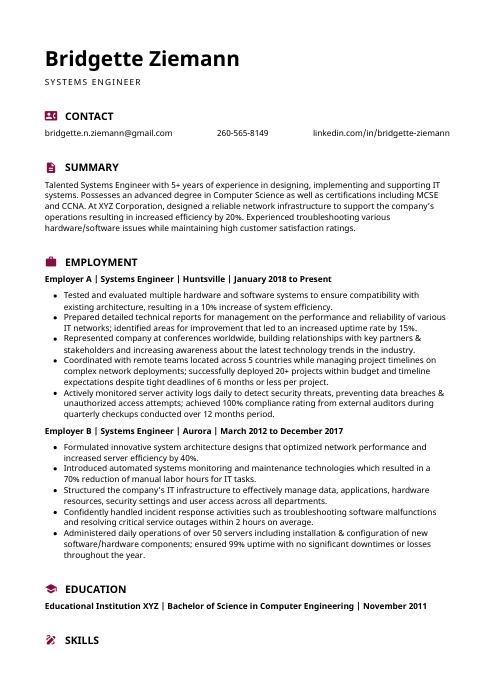 Hoopoe
Hoopoe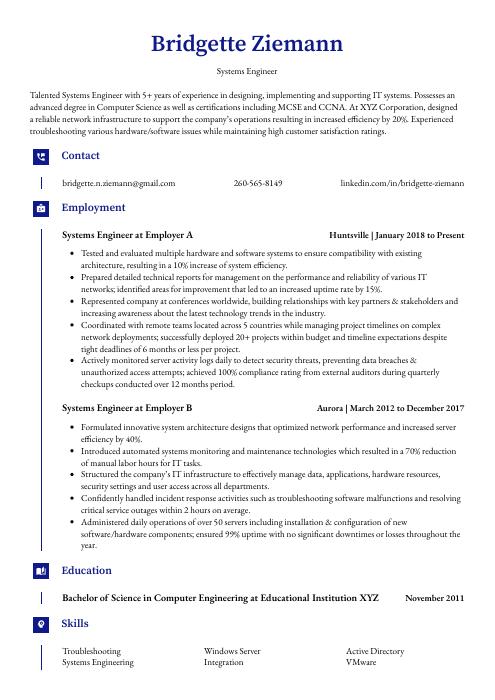 Gharial
Gharial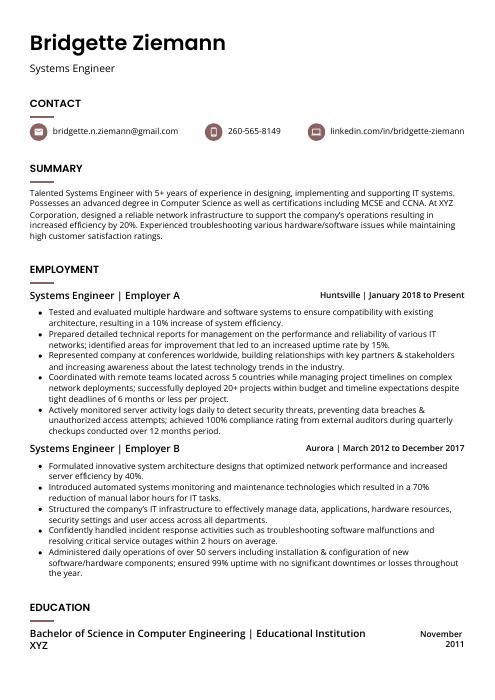 Fossa
Fossa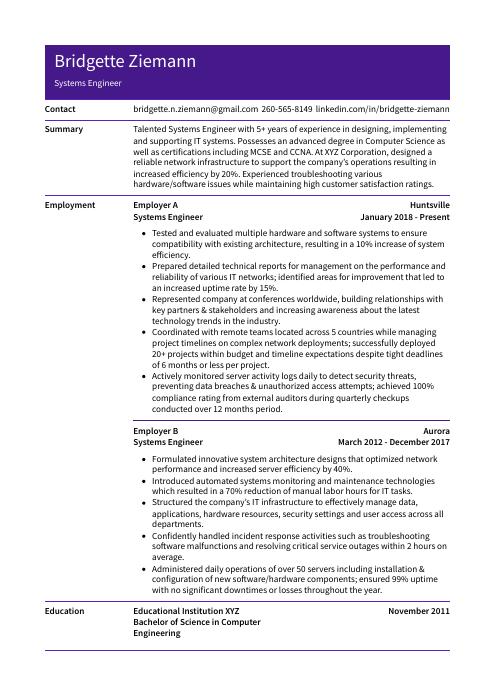 Pika
Pika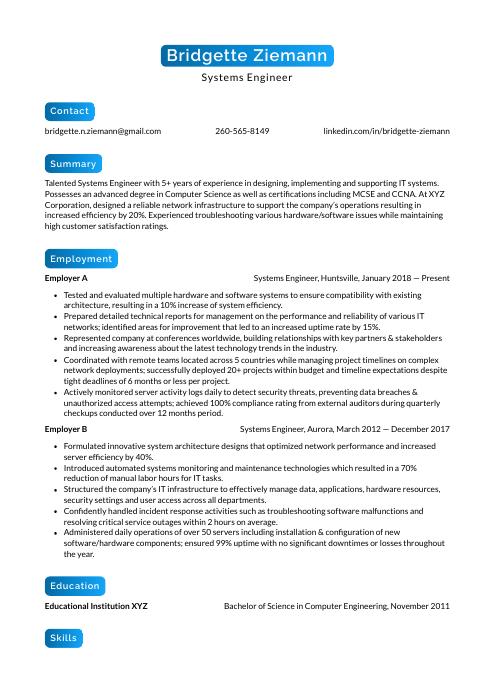 Kinkajou
Kinkajou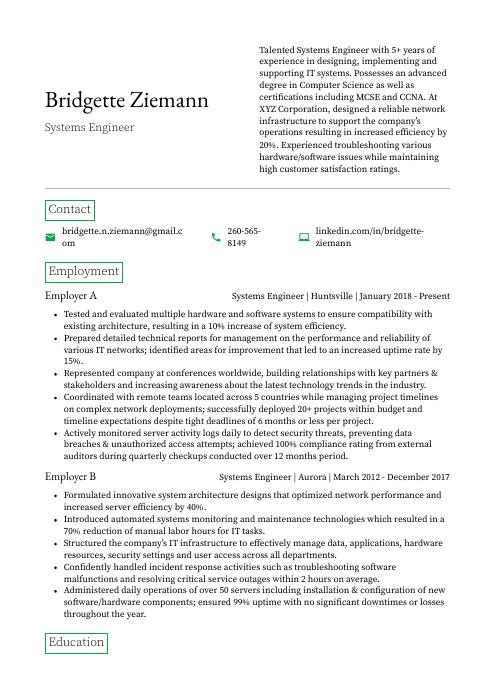 Quokka
Quokka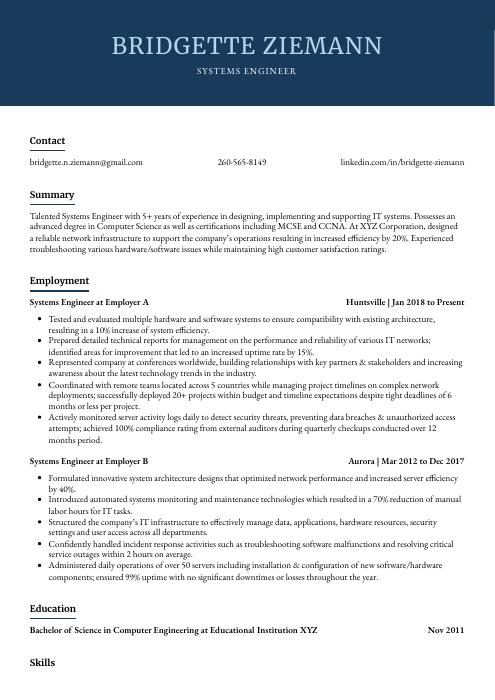 Bonobo
Bonobo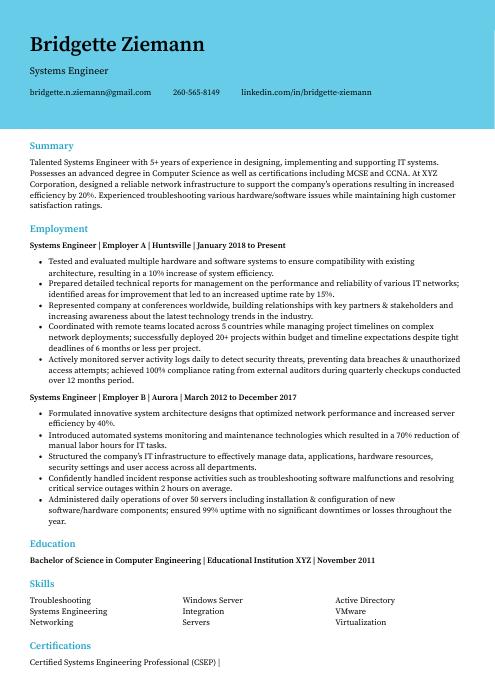 Dugong
Dugong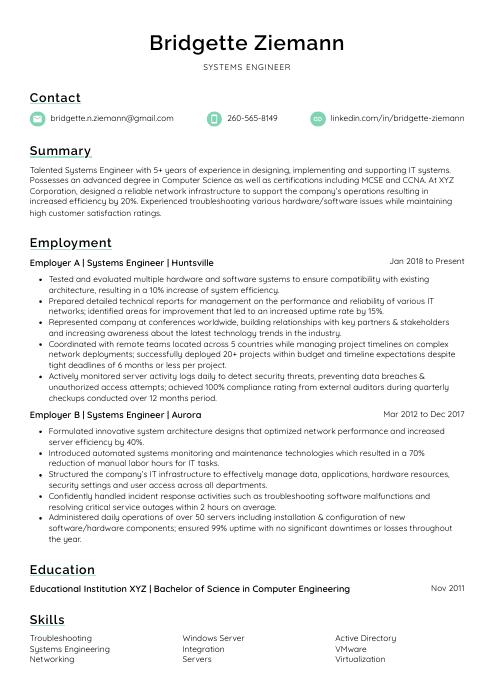 Lorikeet
Lorikeet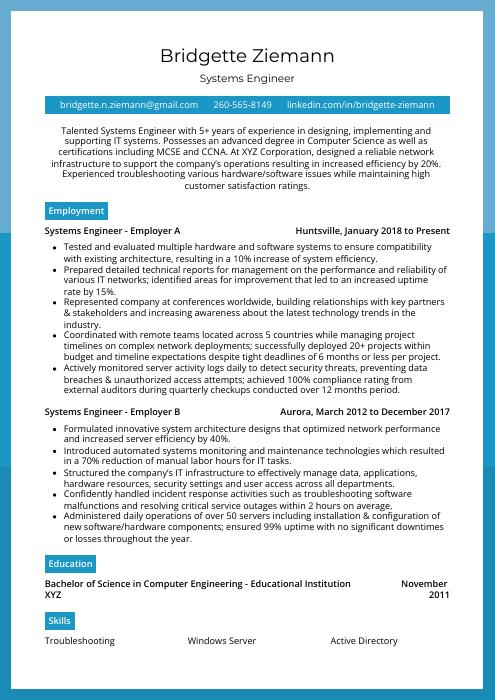 Rhea
Rhea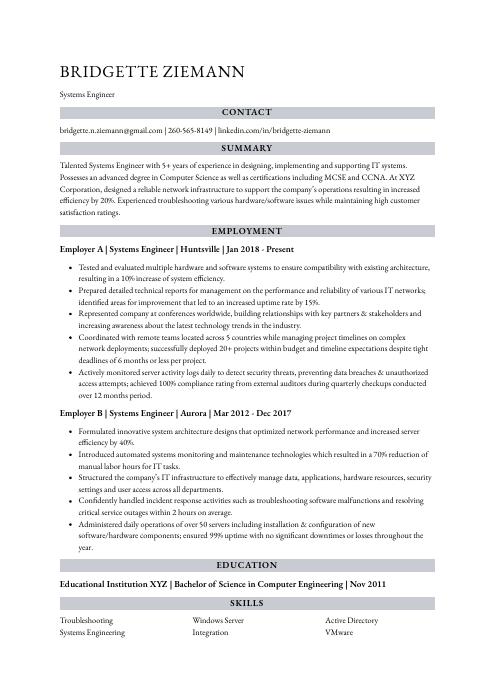 Numbat
Numbat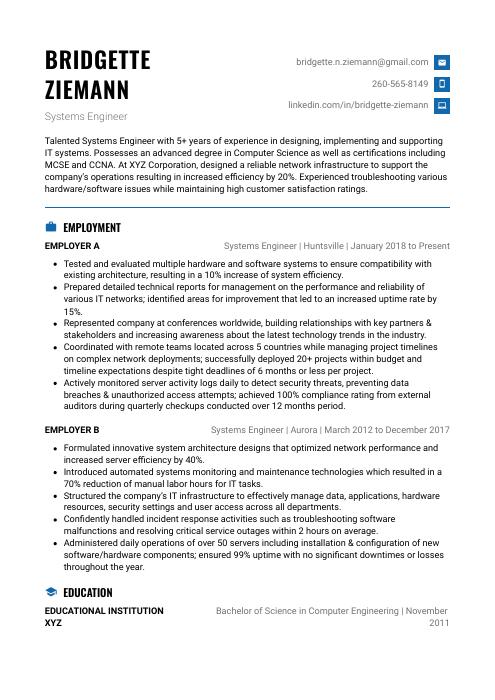 Echidna
Echidna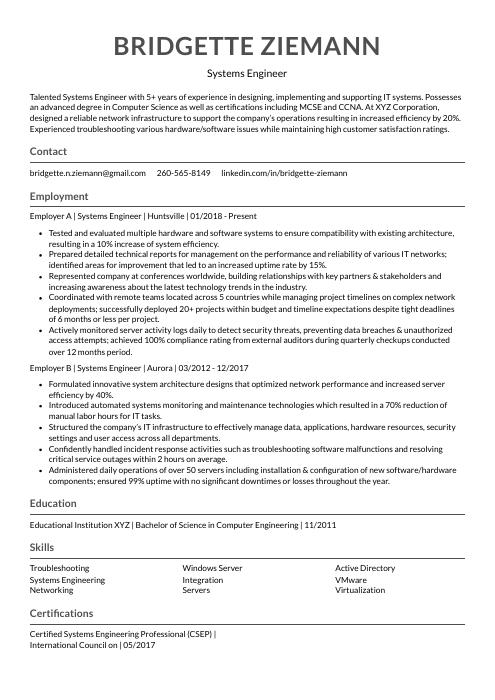 Indri
Indri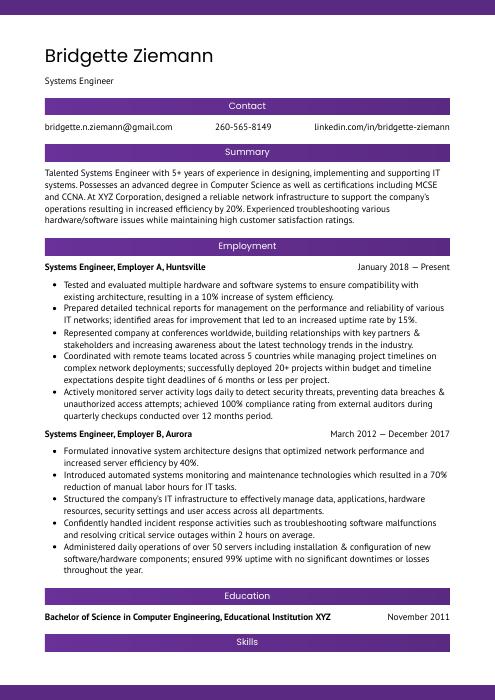 Jerboa
Jerboa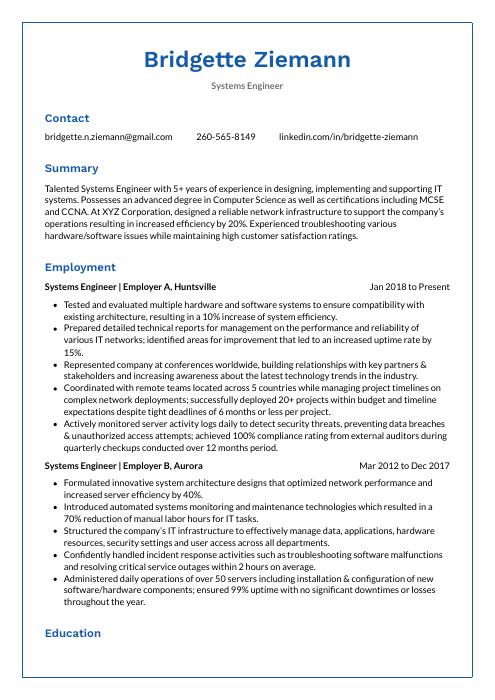 Markhor
Markhor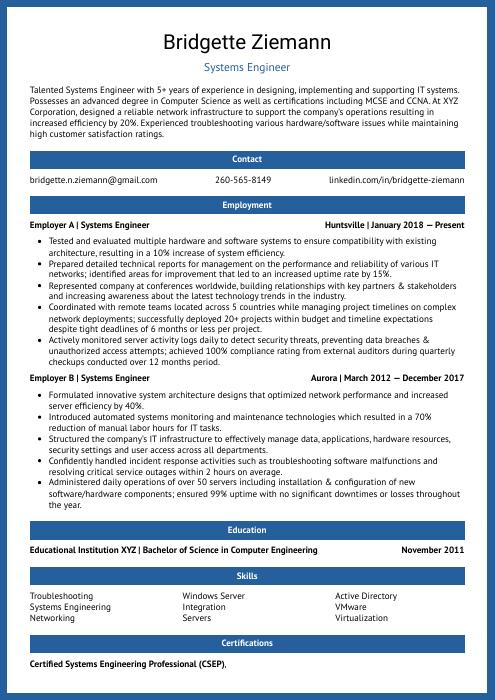 Ocelot
Ocelot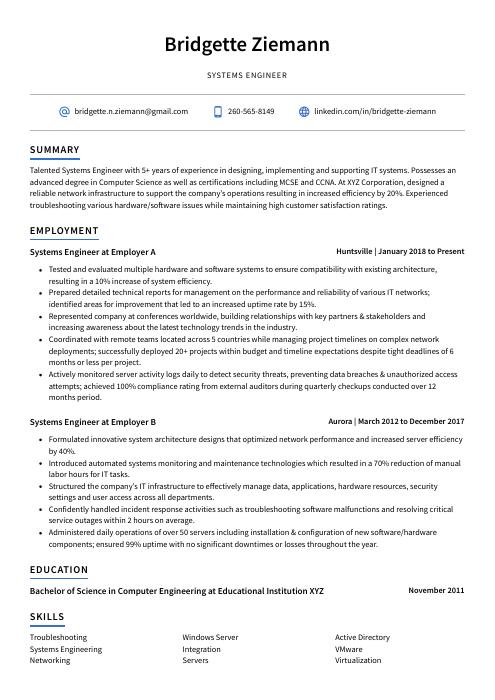 Axolotl
Axolotl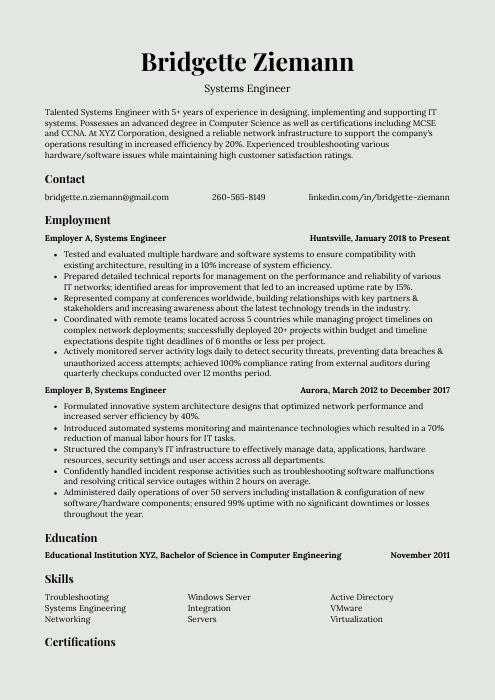 Saola
Saola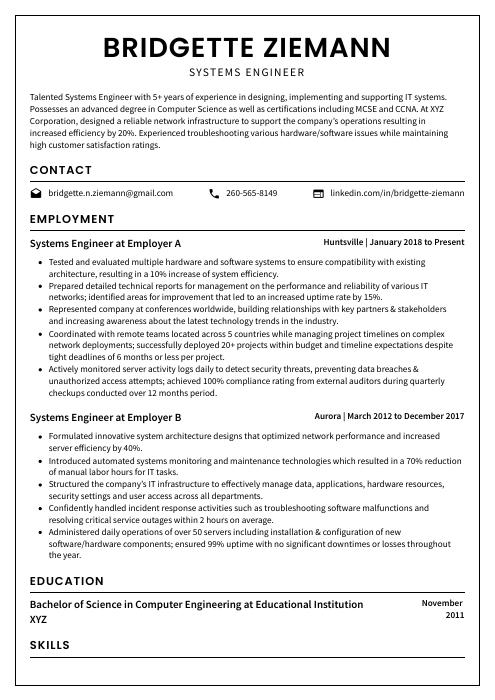 Cormorant
Cormorant Rezjumei
Rezjumei
